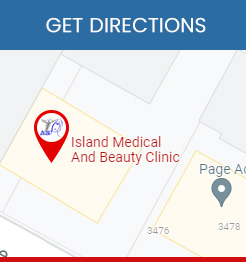Allergies Treatment in Honolulu HI
Allergies Treatment – Island Medical and Beauty Clinic
Do you frequently get nausea, vomiting, a runny nose, or watery eyes? Allergy is a reaction that occurs when the body reacts to an allergen and the immune system responds to foreign substances. The board-certified family medicine physician Dr. Lee DO provides allergy treatment because there is no cure for allergies, the only way in which an individual can manage them is by making themselves aware of their triggers and practicing avoidance. Specific foods, inhalants, medications, and latex bring on these allergic conditions. Once the nature of the allergy is diagnosed, patients can take the necessary steps to limit exposure to the allergen.


Table of Contents:
How Do I Avoid Allergens?
What are ways to manage allergies?
What are the symptoms of allergies?
What are the 10 most common allergies?
The first step in avoiding allergens is identifying what allergens you are reacting to.
An allergy test at your doctor’s office is the only way to know for sure what’s causing your reaction. Once that is determined how you will avoid allergens is dictated by what type of allergy it is.
In order to prevent allergic reactions, you must avoid ingestion of the allergen if you have a food allergy. Read labels carefully and be wary of the potential of cross-contamination especially when eating out.
When experiencing environmental allergies, you can avoid certain outdoor activities and keep your living space clean. When it’s dry and windy, stay indoors.
Whenever it rains, pollen is removed from the air, making the weather that follows ideal for going outside. Mowing your lawn, pulling weeds, and other gardening chores that stir up allergens should be avoided. You should remove your outdoor clothes and take a shower to remove pollen from your skin and hair.
To avoid drug allergies patients must ensure they have an understanding of what they can and cannot consume and to share this information with their doctor, particularly if they are seeing a doctor different than their general practitioner who is less familiar with their medical history.
Because there is no cure for allergies the only way in which an individual can manage them is by making themselves aware of their triggers and practicing avoidance. Once the nature of the allergy is diagnosed patients can take the necessary steps to limit exposure to the allergen. Additionally, their healthcare provider can work with them to ensure they are prepared with the knowledge and medical equipment (such as an EpiPen), as needed so they can manage their allergic reaction when it occurs.
Pollen, dust mites, foods, and other typically harmless substances can trigger allergy symptoms when your immune system overreacts. This substance (also known as a “trigger” or “allergen”) triggers your immune system. Chemicals such as histamine will be released by the immune system as a result of the response. As a result, histamine and other chemicals will cause symptoms like itchiness, hives, and sneezing. An allergic reaction is the result of this immune system response.
There is a wide range of severity when it comes to allergic reactions. Understanding your allergy symptoms and what triggers them is crucial. In that way, you can prevent allergic reactions and know how to treat them if they occur.
The 10 most common allergies fall under the broader categories of food, environmental, and drug allergies. With food allergies, the most common of them.
An allergic reaction to a particular food is caused by a response of the immune system. A number of medical conditions and diseases can cause people to become allergic to gluten. It is possible to prevent serious health problems by eliminating foods containing this protein.
Crustacean and shellfish allergies can cause symptoms such as hives, itching, and swelling in some people. Many people cannot tolerate eggs as an ingredient in their diet due to an allergy, despite eggs being a nutritious source of protein. Mild to severe allergic reactions can result from peanut allergies. Symptoms such as swelling, hives, and extreme redness may appear within minutes after exposure to peanuts. Among children and babies, milk allergies are one of the most common.
Allergies can also be caused by everyday surroundings such as your workplace, home, and the outdoors. Allergens found in the environment are called environmental allergens. There are certain proteins found in the skin cells, saliva, and urine of pets that can cause allergic reactions.
Pollen is one of the most common allergens for people with environmental allergies. Dust mites that live in house dust can cause allergic reactions in some people. It is possible for anyone to breathe in mold spores found in the air.
However, some people may experience allergic reactions if they are exposed to too much.
There is a possibility of a drug allergy to any medication, regardless of whether it is prescription, herbal, or over-the-counter. When taking medications that contain sulfa compounds, be careful. There may be mild to severe allergic reactions such as difficulty breathing, itchy eyes, swelling, and hives in some people.





